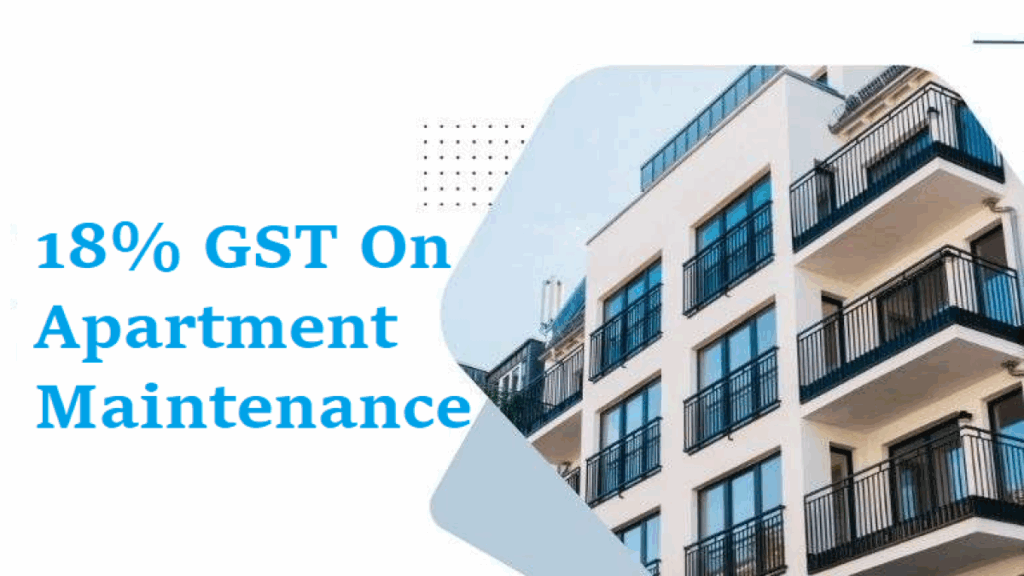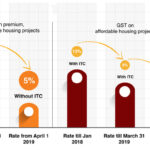18% GST applicable on apartment maintenance over Rs 7,500, RWA
Living in an apartment complex often comes with the convenience of shared amenities and services, funded through monthly maintenance fees collected by the Residents’ Welfare Association (RWA). But have you noticed Goods and Services Tax (GST) being added to your maintenance bill recently, or are you part of an RWA grappling with compliance? There’s often confusion surrounding GST on these charges. The core rule you need to understand is the applicability of 18% GST on apartment maintenance fees, specifically when the monthly contribution per member exceeds a certain threshold – Rs 7,500. Understanding this rule is crucial for residents managing their household budgets and for RWAs aiming to ensure they follow India’s tax regulations correctly. This guide is designed for residents, RWA members, and office bearers in India to clarify the nuances of RWA maintenance fees in India and GST.
Section 1: Understanding GST Basics for RWAs
Before diving into the specific rules for apartment maintenance, let’s quickly cover some GST fundamentals relevant to Residents’ Welfare Associations.
What is GST?
The Goods and Services Tax (GST) is a comprehensive indirect tax levied on the supply of goods and services across India. Introduced on July 1, 2017, it replaced multiple older indirect taxes like Service Tax, VAT, Excise Duty, etc., streamlining the tax structure into a unified system. For RWAs, GST primarily applies because they are considered suppliers of services (maintenance, security, upkeep, etc.) to their members (the residents). Understanding this basic premise is the first step towards navigating compliance requirements.
GST Components Relevant to RWAs
GST is typically levied under three main components:
- CGST (Central Goods and Services Tax): Collected by the Central Government on intra-state supplies (within the same state).
- SGST/UTGST (State Goods and Services Tax / Union Territory Goods and Services Tax): Collected by the State Government (or Union Territory) on intra-state supplies.
- IGST (Integrated Goods and Services Tax): Collected by the Central Government on inter-state supplies (between different states) and imports.
Since RWAs usually provide services to members residing within the same state or union territory, the most common components applicable to their invoices (when GST is chargeable) are CGST and SGST/UTGST, typically split equally (e.g., 9% CGST + 9% SGST for an 18% total rate). IGST would generally not apply to standard maintenance services provided locally.
When Does an RWA Need GST Registration?
Not every RWA needs to register for GST. Registration becomes mandatory only if the RWA’s ‘aggregate turnover’ in a financial year exceeds a specific threshold. Aggregate turnover includes the total value of all taxable supplies, exempt supplies, exports, and inter-state supplies under the same Permanent Account Number (PAN) across India. For service providers like RWAs, the current mandatory GST registration threshold is Rs 20 lakh in annual aggregate turnover for most states and union territories. However, for certain ‘Special Category States’ (like those in the North-East – e.g., Manipur, Mizoram, Nagaland, Tripura), the threshold is lower at Rs 10 lakh.
RWAs must carefully calculate their total annual collections – including maintenance fees, charges for specific facilities (like clubhouse usage), interest on late payments, advertisement income, etc. – to determine if they cross this threshold. Falling under the threshold means GST registration is not mandatory, and thus, GST cannot be charged, even if other conditions are met. Ensuring GST compliance for apartment association fees starts with correctly assessing this turnover. It’s advisable to check the official GST Portal for the latest thresholds and state-specific rules. If you want to learn more about the rules of GST registration, consider exploring the Launching Your Startup Right – Mastering GST Registration in India for comprehensive insights.
Section 2: The Core Rule: 18% GST on Apartment Maintenance Explained
This is where the specific rules for RWAs come into play, particularly the widely discussed Rs 7,500 limit. Let’s break down how 18% GST on apartment maintenance works.
The Exemption Limit: Rs 7,500 Per Month Per Member
The government has provided a specific exemption for services provided by an RWA to its own members. As per relevant GST notifications (specifically, Sl. No. 77(c) of Notification No. 12/2017- Central Tax (Rate), as amended), if the amount charged as contribution for sourcing goods or services for the common use of its members in a housing society or residential complex does not exceed Rs 7,500 per month per member, then such supply is exempt from GST. This exemption applies specifically to the contribution collected for routine maintenance and upkeep activities. It’s crucial to remember this limit is per month per member (i.e., per apartment or housing unit). This rule directly addresses apartment maintenance charges over Rs 7500 India.
When is the 18% GST Applicable?
Here’s the critical point that often causes confusion: If the monthly maintenance contribution charged by the RWA per member exceeds Rs 7,500, then the exemption is lost entirely for that member’s contribution. In such cases, 18% GST on apartment maintenance charges becomes applicable on the entire amount of the contribution for that month, not just the portion exceeding Rs 7,500. For example, if the monthly maintenance is Rs 8,000 per member, GST at 18% will be calculated on the full Rs 8,000. This is a key aspect of the residents welfare association maintenance fees 18% GST rule.
The RWA Turnover Condition
Now, let’s connect the Rs 7,500 contribution limit with the RWA’s aggregate turnover threshold discussed earlier. For GST to be actually charged on the maintenance fees, both of the following conditions must be met simultaneously:
- Aggregate Turnover Threshold: The RWA’s total aggregate turnover in the financial year must exceed the mandatory GST registration threshold (Rs 20 lakh for most states, Rs 10 lakh for Special Category States).
- Contribution Limit: The monthly maintenance contribution charged per member must exceed Rs 7,500.
If the RWA’s total annual turnover is below the registration threshold (e.g., Rs 15 lakh), then GST is NOT applicable on maintenance charges, regardless of whether the individual contribution per member exceeds Rs 7,500. Conversely, if an RWA’s turnover exceeds the threshold (e.g., Rs 25 lakh) but the monthly maintenance charged per member is below Rs 7,500 (e.g., Rs 6,000), GST is also NOT applicable due to the specific exemption. Understanding these interacting apartment maintenance GST rules India is vital for correct application. Additionally, it is important to understand the broader implications of GST on various services, which you can read about in GST on apartment maintenance: What the ₹7,500 threshold means for housing societies.
Calculation Example
Let’s illustrate this with a few scenarios, assuming the RWA is located in a state with a Rs 20 lakh registration threshold:
| Scenario | RWA Aggregate Annual Turnover | Monthly Maintenance per Member | Does Turnover exceed Threshold? | Does Contribution exceed Rs 7,500? | GST Applicable? | Calculation (If Applicable) | Total Bill per Member |
|---|---|---|---|---|---|---|---|
| Scenario 1 | Rs 25 Lakh | Rs 6,000 | Yes | No | No | N/A | Rs 6,000 |
| Scenario 2 | Rs 25 Lakh | Rs 8,000 | Yes | Yes | Yes @ 18% | Rs 8,000 * 18% = Rs 1,440 (Rs 720 CGST + Rs 720 SGST) | Rs 9,440 |
| Scenario 3 | Rs 18 Lakh | Rs 8,000 | No | Yes | No | N/A | Rs 8,000 |
| Scenario 4 (Special Category State) | Rs 15 Lakh | Rs 8,000 | Yes (assuming Rs 10 Lakh limit) | Yes | Yes @ 18% | Rs 8,000 * 18% = Rs 1,440 | Rs 9,440 |
These examples clearly show that both conditions – the RWA’s turnover exceeding the registration threshold AND the monthly contribution per member exceeding Rs 7,500 – must be met for the 18% GST on apartment maintenance to apply.
Section 3: What Constitutes “Maintenance Charges”?
Understanding which charges collected by the RWA fall under the umbrella of “maintenance contribution” for the purpose of the Rs 7,500 limit and aggregate turnover calculation is essential.
Scope of Maintenance Services Covered
The term “maintenance charges” or “contribution” generally covers amounts collected by the RWA for the purpose of maintaining and managing the housing society or residential complex for the common use and benefit of all members. This typically includes expenses related to:
- Security services: Guard salaries, agency fees.
- Housekeeping and cleaning: Staff salaries, cleaning supplies for common areas.
- Common area utilities: Electricity for lifts, lobbies, staircases, common lights; water charges for common areas and gardening.
- Lift maintenance: Annual maintenance contracts (AMCs), repairs.
- Gardening and landscaping: Maintenance of common gardens and green spaces.
- Repairs and maintenance: Minor civil or electrical work in common areas, plumbing repairs for common lines.
- Insurance: Premiums for insuring common property or equipment.
- RWA administrative expenses: Office rent (if any), stationery, accounting fees, audit fees.
- Common facility upkeep: Maintenance of clubhouse, swimming pool, gym, community hall (if applicable).
Essentially, these are services supplied collectively by the RWA to its members, and the charges levied for these form the core maintenance contribution. Understanding GST applicable on maintenance services involves recognizing this broad scope.
Charges Typically Included in Aggregate Value
When calculating the Rs 7,500 per member limit and the RWA’s aggregate turnover, certain other mandatory collections are usually included if they form part of the regular contribution demanded from members for the upkeep and functioning of the complex. This often includes:
- Sinking Fund Contributions: Amounts collected periodically to build a reserve for major future repairs or replacements (e.g., building painting, major structural repairs, lift replacement).
- Repair Fund Contributions: Similar to the sinking fund, potentially earmarked for slightly less extensive repairs.
- Corpus Fund Contributions: Often a one-time or periodic collection aimed at building a long-term capital fund for the RWA.
The key principle, as clarified by CBIC circulars (like Circular No. 109/28/2019-GST), is that if these charges are collected by the RWA for the supply of services and management of the complex, they are generally considered part of the value of supply and included in the aggregate turnover calculation and for checking the Rs 7,500 threshold. Managing these funds and ensuring compliance can be complex, especially for larger RWAs, hence considering professional help from providers like TaxRobo can be beneficial. For more details, visit the service page GST Return Filing – Get Expert Accountants for GSTR Filing.
Potential Exclusions (Handle with Care)
Certain amounts collected by the RWA might not be considered part of the maintenance service value, but careful assessment is required:
- Property Tax / Municipal Tax: If the RWA collects property tax from individual members solely to pay it to the municipal authority on their behalf, it might qualify as acting as a ‘pure agent’. Strict conditions under GST rules must be met for this exclusion (e.g., separate identification on invoice, exact reimbursement, no title to goods/services procured). If these conditions aren’t met, it could be included in the value.
- Individual Utility Charges: Charges collected based on individual apartment meter readings (e.g., electricity consumed within the flat, piped gas, individual water meters) and passed on at actuals are typically not considered part of the common maintenance service provided by the RWA. These are reimbursements for individual consumption.
- Interest on Late Payments: While this adds to the RWA’s income and aggregate turnover, it’s generally not part of the base ‘maintenance charge’ used for the Rs 7,500 calculation, though GST might be applicable on the interest component itself if the RWA is registered and the underlying service was taxable.
Actionable Advice: RWAs should meticulously review the nature of each charge they collect from members. Distinguishing between common area maintenance contributions and other collections (like pure agent reimbursements or individual utility payments) is crucial for correct GST calculation. Consulting a tax professional is highly recommended for ambiguous items.
Section 4: Implications for Residents and RWAs
The application of GST on maintenance charges has direct consequences for both the residents paying the fees and the RWAs managing the society’s affairs.
Impact on Residents
For residents living in complexes where the RWA is GST-registered and their individual monthly contribution exceeds Rs 7,500, the most direct impact is an increase in their monthly outgo. As seen in the examples, an 18% GST levy significantly increases the total amount payable. Understanding how GST affects apartment maintenance fees helps residents budget accordingly. Residents should also check their maintenance bills to ensure transparency:
- The bill should clearly show the RWA’s GST Identification Number (GSTIN).
- It must break down the GST charged into CGST and SGST/UTGST components.
- The taxable value (the maintenance charge) and the tax amount should be distinct.
Paying attention to these details ensures the charges are legitimate and compliant.
Responsibilities of the RWA
If an RWA meets the conditions requiring GST registration (turnover > threshold AND contribution > Rs 7,500 for any member), it assumes several compliance responsibilities under the GST regime:
- Obtain GST Registration: Apply for and obtain a GSTIN from the tax authorities.
- Charge Correct GST: Levy GST at the applicable rate (currently 18%) on the entire maintenance contribution for those members whose monthly share exceeds Rs 7,500.
- Issue Tax Invoices: Provide members with proper GST-compliant tax invoices containing all mandatory details (GSTIN, HSN/SAC codes, place of supply, tax breakdown, etc.).
- File GST Returns: Regularly file GST returns, primarily:
- GSTR-1: Statement of outward supplies (details of invoices issued).
- GSTR-3B: Summary return and tax payment.
- Annual Return (GSTR-9/9C, if applicable).
- Maintain Records: Keep detailed books of accounts and records as prescribed under GST law (invoices, receipts, payment vouchers, ITC records, etc.) for audit purposes.
Meeting these GST compliance for apartment association fees requirements is mandatory to avoid penalties and legal issues. The shift from the previous Service Tax regime means RWAs must adapt to these apartment service tax implications India under the current GST framework.
Input Tax Credit (ITC) for RWAs
A significant aspect for GST-registered RWAs is the ability to claim Input Tax Credit (ITC). This means the RWA can claim credit for the GST it pays on the goods and services it purchases (inward supplies) to maintain the complex. Examples include:
- GST paid to security service agencies.
- GST paid on housekeeping materials (cleaning supplies, disinfectants).
- GST paid on repair and maintenance services (lift AMC, plumbing services, electrical repairs).
- GST paid on accounting, auditing, or legal fees.
- GST paid on capital goods like water pumps or generators used for common areas.
This claimed ITC can then be used to offset the RWA’s output GST liability (the 18% GST collected from members on maintenance charges). While ITC doesn’t eliminate the 18% GST charged to members whose contribution exceeds Rs 7,500, it reduces the net tax payable by the RWA to the government. This can potentially help the RWA manage its overall costs slightly better, although the benefit is indirect for the end resident paying the gross amount including GST. Proper record-keeping and adherence to ITC rules (like matching invoices in GSTR-2B) are essential for claiming ITC correctly.
Section 5: Staying Compliant and Seeking Help
Navigating the complexities of GST, especially the specific rules applicable to RWAs, requires careful attention and often professional assistance.
Key Compliance Checklist for RWAs
To ensure compliance and avoid issues, RWAs should follow these key steps:
- Monitor Aggregate Turnover: Continuously track total annual collections from all sources to check if the Rs 20 lakh (or Rs 10 lakh) threshold is approaching or crossed.
- Assess Contribution Levels: Regularly review the monthly maintenance charge per member to see if it exceeds the Rs 7,500 exemption limit.
- Determine GST Liability: If both the turnover threshold is crossed and the contribution limit per member is exceeded, understand that GST registration and charging become mandatory.
- Register if Required: Apply for GST registration promptly once the conditions are met.
- Implement Correct Billing: Set up an accounting and billing system that correctly applies 18% GST (9% CGST + 9% SGST/UTGST) on the full contribution amount for applicable members and issues compliant tax invoices.
- File Returns Timely: Ensure all GST returns (GSTR-1, GSTR-3B, Annual Return) are filed accurately and by the due dates.
- Claim Eligible ITC: Maintain proper records of inward supplies and claim eligible Input Tax Credit to reduce the net tax burden.
- Maintain Financial Records: Keep detailed and organised financial records as required under GST law for audits and assessments.
Importance of Professional Guidance
The interpretation of ‘aggregate turnover’, the scope of ‘maintenance charges’, eligibility for ‘pure agent’ status, and the rules for Input Tax Credit can be complex. Mistakes in compliance can lead to interest, penalties, and legal disputes. Given these complexities, it is highly advisable for RWAs, especially those nearing or crossing the registration threshold, to:
- Consult with Tax Professionals: Engage with Chartered Accountants (CAs) or tax consulting firms specializing in GST.
- Seek Assistance for Registration & Filing: Utilize professional services for accurate GST registration, setting



